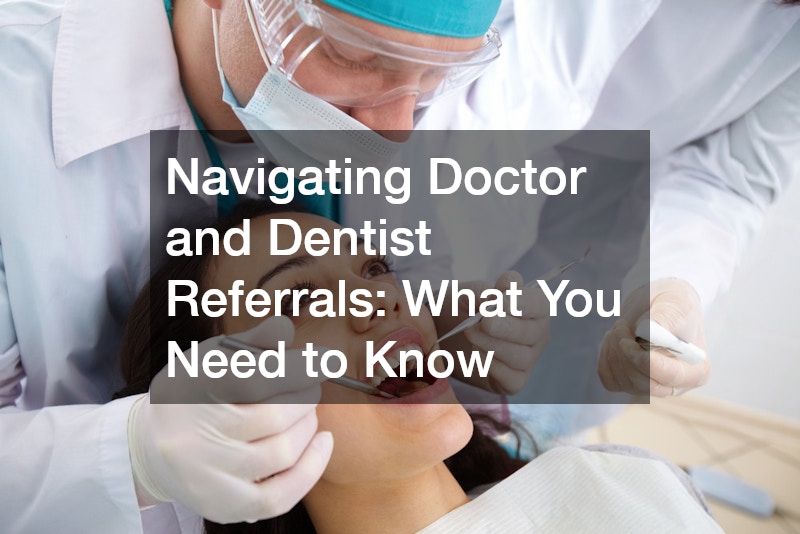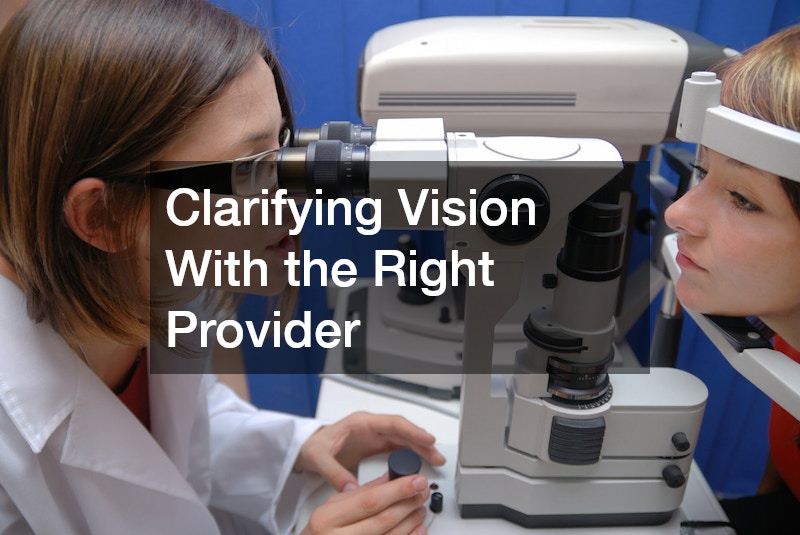
Healthcare can be overwhelming—especially when you’re trying to find the right provider, understand your insurance, and manage appointments all at once. Whether you’re seeking a specialist or simply trying to find someone new, referrals play a key role in guiding your decisions. A doctor or dentist referral isn’t just a piece of paper; it’s a trusted recommendation based on professional insight. In this blog, we’ll walk through the essentials of navigating doctor and dentist referrals, highlight what to ask, and help you make informed choices. Along the way, we’ll explore real-world examples from medical and dental specialties, as well as how referrals can intersect with insurance, workplace benefits, and holistic care. Understanding how a doctor reference works can streamline your healthcare journey and improve your outcomes.
When Immediate Care Is a Priority
Sometimes you need medical help fast, but it’s not quite serious enough for the emergency room. In these cases, your primary care doctor may recommend visiting an urgent care clinic. These clinics are essential for handling non-life-threatening situations like infections, sprains, or minor cuts. If you’re unsure where to go, a doctor’s reference can point you to a trustworthy facility. Many urgent care providers work closely with general practitioners, so the referral ensures continuity of care. You’ll also want to ask whether the clinic will share visit notes or lab results with your primary provider. That communication can be crucial if you require follow-up treatment. Always check if the clinic accepts your insurance and has electronic health record access. Whether you get a referral for weekend flu symptoms or a midweek injury, knowing your options makes the experience less stressful. Urgent care clinics also fill a gap in the healthcare system, offering faster access than traditional appointments. With a reference, you can feel confident that you’re not only getting timely attention but also professional continuity. A good referral bridges the gap between urgent and ongoing care.
Clarifying Vision With the Right Provider

Eye health is often an afterthought—until problems arise. Whether it’s blurry vision, eye strain, or annual checkups, a local eye doctor plays a key role in your overall health. Your primary care physician might issue a doctor reference to an optometrist or ophthalmologist, depending on your condition. For routine vision screenings, an optometrist is often enough. However, for eye diseases or surgical needs, you’ll be referred to a specialist. The value of a referral here is not just convenience but also trust. Primary care doctors tend to refer patients to eye doctors they’ve worked with before or received positive feedback about. This means your care is more likely to be coordinated and of high quality. Don’t hesitate to ask your referring provider why they chose a particular eye specialist—sometimes there’s a reason beyond proximity, such as expertise in a specific condition. Understanding this can give you peace of mind. And if your vision problems are related to another issue—like diabetes—a reference helps ensure your eye care fits into the bigger picture. Good vision is foundational to your quality of life, and having the right eye care partner makes a major difference.
Brightening Smiles Through Specialized Care
In today’s image-conscious world, dental aesthetics are becoming just as important as oral health. If you’re unhappy with your smile, your general dentist might offer a doctor reference for cosmetic dentistry. This branch of dental care focuses on improving appearance through treatments like teeth whitening, veneers, and reshaping. Unlike basic dental cleanings, cosmetic procedures often require specialized skills and tools. A referral ensures you’re seeing a dentist with advanced training in these techniques. Many cosmetic dentists have certifications and portfolios of previous work, so be sure to ask for examples. A referral also means better communication between your general dentist and specialist, which is important for treatment planning. Whether you want a simple polish or a complete smile makeover, having that reference can speed up the process and eliminate trial-and-error. Insurance may not cover cosmetic procedures, so discussing costs upfront is also crucial. With the right referral, you’ll not only get quality treatment, but you’ll also gain confidence and a more attractive smile. The path to cosmetic dental improvements often starts with one trusted recommendation from your general dentist.
Structuring Dental Health With Precision

If your teeth are crowded, misaligned, or causing bite issues, you may be referred to a specialist in orthodontic dentistry. General dentists frequently provide a doctor reference to orthodontists for patients who need braces or retainers. Orthodontic care isn’t just about appearance—it can also prevent headaches, jaw pain, and tooth damage. Your dentist may detect signs of misalignment during routine exams and recommend an evaluation with an orthodontist. A referral helps ensure you’re seeing a board-certified provider with the right experience for your case. From traditional braces to clear aligners, orthodontists use a wide range of tools to straighten teeth and improve function. They often use digital imaging to create precise treatment plans, and referrals allow seamless communication between both providers. If your child or teenager needs care, a referral also offers a faster path to early intervention, which can shorten treatment time. The benefits of orthodontics last a lifetime, improving not just your smile but also your comfort. When your general dentist makes a doctor reference, it’s based on clinical expertise and often past successful collaborations with the orthodontist. That assurance leads to better treatment outcomes and smoother patient experiences.
Invisible Solutions With Clear Benefits
Modern orthodontics has evolved, and one of the most popular innovations is invisalign services. If you want to correct crooked or spaced teeth without metal braces, your general dentist might give you a reference to a provider who specializes in Invisalign. These clear aligners are removable, virtually invisible, and custom-made for your teeth. While they offer convenience and discretion, Invisalign isn’t suitable for everyone—some cases require more complex orthodontic treatment. That’s why a referral matters. Your primary dentist or orthodontist can determine whether Invisalign is the right fit and guide you to a provider with verified training in this method. Invisalign treatment requires consistent monitoring, so having a trusted referral ensures ongoing care. It also improves coordination between your existing dentist and the Invisalign provider, streamlining everything from X-rays to follow-up visits. Insurance coverage for Invisalign varies, and a professional referral can sometimes help with claim approvals or pre-treatment authorizations. The right doctor reference can turn a complicated decision into a clear path. If you’re looking for a discreet solution to improve your smile, a trusted referral is the first step toward making it happen efficiently and correctly.
Care for Cognitive Conditions and Aging Loved Ones

Navigating referrals becomes even more essential when dealing with aging family members and cognitive health. When dementia or Alzheimer’s disease is suspected, a referral to memory care facilities may be necessary. These specialized care centers provide 24/7 support in secure, comfortable environments tailored to individuals with memory loss. Unlike general nursing homes, memory care facilities often use cognitive therapies, specialized activities, and structured routines to slow mental decline. Getting a referral from a primary doctor or neurologist ensures that the facility can meet the patient’s medical and behavioral needs. A referral can also speed up admissions and assessments, helping families access resources sooner. Many of these facilities work closely with referring doctors to update them on progress and adjust medications or treatments as needed. For caregivers, having the guidance of a healthcare professional offers emotional relief and confidence in their decisions. Choosing memory care is a significant life event, and the expertise of a doctor reference removes much of the uncertainty. When memory begins to fade, clarity from trusted medical sources becomes more important than ever. A referral can connect your loved one to compassionate and effective long-term care.
Employer-Supported Health Choices
When searching for the right provider, some patients forget to factor in their work-related coverage. Many organizations now offer expanded healthcare benefits for employees, which may include referrals to specialists, wellness programs, and mental health services. If your workplace offers a health concierge or on-site clinic, that can be a direct source of a reference. Employers are increasingly partnering with health systems to streamline access and reduce costs. In many cases, these referrals come from company-sponsored health portals or virtual care providers. For employees, this adds convenience and ensures the provider is covered by their insurance. Some plans also include pre-vetted networks of specialists, dentists, or therapists, which can be accessed with a simple referral request. When choosing a new provider—especially for ongoing or specialized care—check whether your workplace can assist. You might discover faster appointment availability or reduced fees through your company’s partnerships. A doctor reference facilitated through employer benefits doesn’t just save money; it simplifies your search and supports a healthier work-life balance. Take full advantage of these resources—they’re part of your compensation package and designed to improve your well-being.
Alignment and Relief Through Physical Therapy

Not all referrals come from general doctors—some come from alternative healthcare providers. If you’re experiencing chronic pain, headaches, or musculoskeletal issues, you may be referred to a chiropractor. Chiropractic care focuses on spinal alignment and joint mobility, often providing relief for issues that don’t respond well to medication. Your primary care physician may offer a doctor reference for chiropractic services when traditional treatments aren’t effective or suitable. The right chiropractor will take a holistic approach, assessing posture, movement, and overall health. Referrals ensure you’re connected to licensed professionals with a proven track record. Chiropractors often collaborate with physical therapists, orthopedic specialists, and pain clinics to offer integrated treatment plans. Getting a referral also improves the chance of insurance coverage, as many providers require a referral for reimbursement. Whether you’re recovering from an injury or managing chronic discomfort, a chiropractic referral can lead to more targeted and effective care. It represents a bridge between conventional medicine and holistic healing—a union that can improve your quality of life and reduce long-term dependence on medications.
Aesthetic Enhancements With Medical Precision
When it comes to altering your appearance through medical procedures, safety and skill are paramount. If you’re considering a physical transformation, your general doctor or dermatologist may provide a reference to a trusted cosmetic surgeon. This type of referral ensures that the surgeon is board-certified, experienced, and has a track record of successful outcomes. Cosmetic surgery includes procedures ranging from facial enhancements to body contouring, and not all providers are equally qualified. A referral connects you with someone who’s been vetted both for medical competence and ethical practices. It also ensures pre-and post-operative care is coordinated, reducing the risk of complications. Be sure to ask your referring doctor why they chose a specific surgeon and whether they’ve collaborated before. That can offer extra assurance that your care will be seamless. Since cosmetic procedures often involve both medical and psychological considerations, the right referral offers peace of mind from start to finish. A well-informed doctor reference is the foundation for safe, satisfying cosmetic results that align with your goals and health needs.
Establishing a Lifelong Healthcare Relationship
A primary care service is often your first stop on the healthcare journey. These providers manage everything from annual physicals to chronic disease monitoring. When you need a referral, they’re usually the ones issuing it. A reference from a primary care provider carries weight because it’s based on a long-term understanding of your health history. These professionals coordinate with specialists, track medication interactions, and provide continuity of care. If you’re new to an area or switching doctors, finding a reliable primary care provider should be a top priority. They’ll guide you to trusted specialists and ensure your treatments align. Ask about their referral process and network relationships—some primary care doctors work within specific health systems that streamline referrals and billing. The value of a strong primary care relationship extends far beyond annual checkups. It anchors your entire healthcare experience, ensuring that any specialist you see is brought in at the right time, for the right reason. Every effective reference begins here—with someone who knows your body, history, and goals better than anyone else on your medical team.
Referrals aren’t just about finding the next provider—they’re about building a trustworthy network of care. From urgent treatments to long-term wellness strategies, a well-placed doctor reference helps you navigate your options with confidence. Whether you’re addressing dental issues through orthodontics, considering a cosmetic surgery, or looking into memory care for a loved one, the right referral makes the journey safer and more effective. It ensures you’re not starting from scratch but from a place of trust, expertise, and collaboration.
Next time you’re faced with a health decision, don’t go it alone. Ask for a reference, and let that recommendation become your roadmap to better care.

